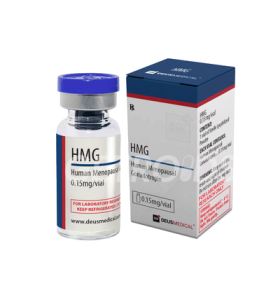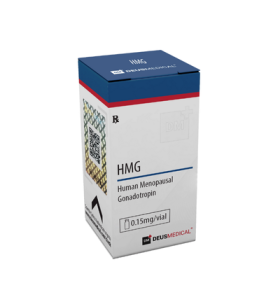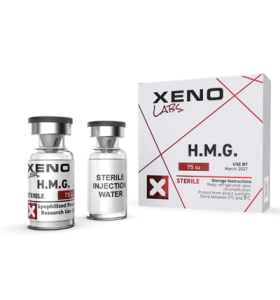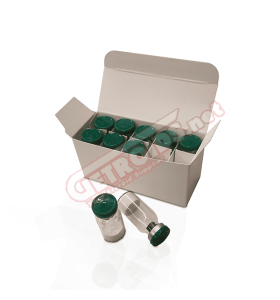HMG Category Products
HMG (Human Menopausal Gonadotropin): The Ace Player in Fertility Treatments
HUMAN MENOPAUSAL GONADOTROPIN ( HMG) or Menotropin is a medication containing FSH and LH in urine of post menopausal women These are the hormones, which is one of them in humans and other types of mammals: this hormone helps to control their growth, but also plays a critical role into both male (by controlling development, ) and female reproductive cycle.
HMG Replacement In Fertility Treatments HMG especially useful for cooperative ovum sperms production, a common issue in those suffering from infertility caused by hormonal's imbalances. Commonly it is given to women as a part of the ovulation induction process or in men as a solution for increasing sperm synthesis.
What is HMG?
HMG contains two of the major reproductive hormones FSH and LH. It partners with FSH for the maturation of ovarian follicles in females and sperm production in males. In women, LH induces ovulation; in men it stimulates the synthesis of testosterone which is very important for sperm maturation.
We call this medication, Human Menopausal Gonadotropin (HMG) which unlike other fertility medications with only FSH does also contain LH thus offering a balanced combination of both hormones and making it the most potent anatomy ready to be maximized for conception set up available especially in cases when multiple hormonal deficiencies are competing against you. Because HMG increases the levels of both hormones, they can stimulate ovulation and follicle maturation in women as well as improve sperm counts in men.
Mechanism of Action
HMG functions via imitation of the body's inherent FSH and LH hormones to inspire reproductive organs. The main purpose of HMG in women is to induce the ovaries, so that more than one egg developed during a menstrual cycle.
The hormone stimulates the maturation of ovarian follicles (which contain eggs). As an example, HMG helps follicles mature faster so that they can be used to harvest eggs for IVF (or even fertilized in the body if medications like hCG are also made available).
HMG leads to the production of testosterone in men and increases spermatogenesis, i.e. sperm formation. Increased sperm count and quality can be achieved with the use of HMG in male patients presenting with low sperm counts due to hormonal deficiencies. Thus improving their chances at spawning children through treatment using ICSI or IVF[4].
Potential Benefits of HMG
1. Ovulation in Women Induced
It is a common adjunct medication used to induce ovulation in women with anovulatory disorders (i.e., they do not spontaneously ovulate either due to polycystic ovarian syndrome, or ovaries that give up through environmental duress). For women who have reduced FSH and LH levels, HMG may help these produce eggs and sufficiently release them allow for pregnancy.
2. Men Improve Sperm Production
HMG can be given to men with hypogonadism or other hormonal inadequacies which are causing abnormal production of sperm. HMG are gonadotrophins that directly stimulate the testes to produce testosterone, thus this activity can improve responses of sperm and their maturation helping yield better outcomes in terms of fertility.
3. Helping ART — Assisted Reproductive Technologies
In the IVF treatments, HMG is used to trigger the ovaries of women in order generate eggs instead fertilizing multiple for later implantation. Increased numbers of eggs increase the likelihood that fertilising an egg will result in a transcending embryo, and thus improve IVF success.
4. Balanced Hormonal Stimulation
Unlike pure FSH or LH based treatments, HMG combines equal amounts of both hormones to deliver the best possible results for individuals with complex fertility issues who need this more end-to-end hormonal cover.
5. More Successful Pregnancies
It has been very helpful in increasing pregnancy success rates when HMG is considered as part of fertility treatment such as IVF or IUI, which means the use during this process contributes to a good egg production and sperm quality.
Risks and Side Effects of HMG
While it can also be very effective, use of HMG has pitfalls and side effects that are more likely to occur with less careful medical supervision:
Ovarian Hyperstimulation Syndrome (OHSS): This is an uncommon, but occasionally severe disease which presents as swollen and painful ovaries after hormone stimulation. Symptoms can range from simple abdominal pain to broadening of the abdomen,abdominal bloating, Nausea and occasionally with terrible edema (being also a difficulty breathing).
Multiple Pregnancies: The use of HMG, as well as other fertility treatments that stimulate the ovaries to produce multiple eggs at a time also increases chances for twins & triplets or higher-order pregnancies (riskier because mother AND babies are more likely to have complications such premature birth and low birth weight.
Injection Site Reactions : As with most injectable medications, some people who take HMG may experience pain at the injection site or have redness.
Mood Swings and Hormonal Changes: The hormone used in fertility treatments (such as HMG) can cause your mood to swing, be more touchy and moody or have other psychological effects due to the rapid hormonal fluctuations.
Side Effects In Other Patients: Headaches, bloating, nausea and breast tenderness may also occur during HMG treatment.
Hormone levels must be monitored with blood tests, and dosages adjusted by a healthcare provider to avoid complications.
FAQs
1. Is HMG the same as HCG?
HMG and HCG are not the same hormone. Infact, HCG (human chorionic gonadotropin) will trigger ovulation in women and increase testosterone production including the hormones LH & FSH. HCG is an escellent post HMG injection to finalise ovulation.
2. Is HMG for Men and Women?
HMG however, is used in both men and women for treatment of fertility. In women, it acts on the ovaries to produce eggs and in men, increases testosterone secretion by stimulating sperm production from testes.
3. How is HMG administered?
HMG is injected subcutaneously or intramuscularly, usually for a few days serially in the woman's menstrual cycle (preceding intrauterine insemination) and cyclically in men being treated because of infertility. The type and amount of medication is determined according to personal hormonal profile with regards to fertility desire.
4. Does HMG have long-term side effects?
HMG is administered under the supervision of a doctor and there have not been reports that prove long-term side effects from this treatment. On the other hand,certain levels and incorrect doses would likely cause hormonal imbalances or interference with OHSS. Thus it is vital to heed medical advice carefully.
Conclusion
Human Menopausal Gonadotropin, known as HMG is an important component of contemporary fertility treatments allowing a more natural co-ordinated reproductive stimulation incorporating FSH but also LH. It has been highly successful in treating inducement ovulation in females and increase decrease of sperm quantity which is very important when we talk about assisted reproductive techniques like insemination, IVF etc.
The significant drawbacks of using HMG include OHSS and multiple pregnancies. Like any hormone therapy, it requires thoughtful monitoring and a watchful eye of your physician to ensure you are reaping the maximum benefit with minimum harm.


























